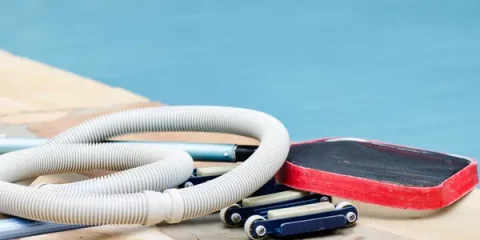Maybe you installed a custom pool or bought a home specifically because there was a pool. Regardless of how you got your swimming pool, it’s an investment that brings countless days of fun for your family. It can also increase your home’s resale value. With that in mind, why would you not take care of the pools pump? It acts as the heart of the pool, pumping water into the pool and out through the filters and back again. If you’re looking for local pool pump repair in your city, look no further.
As the water flows, it brings in chemicals that keep your pool water clear and free of microbes. If you have a heated pool, the water flows through the heater before going back into the pool, all because of your pool’s pump. Without a properly functioning pump, your pool could be filled with algae and have various types of debris floating on or just below the surface. Now that you know about the importance of your pool’s pump let’s take a closer look at it and some things you need to know.
We are licensed with years of experience. That’s why we can keep your pool in tip-top shape.
How Long Should Your Pool Pump Last?
Depending on factors like use, maintenance and operating conditions, your pool pump can last anywhere between eight to twelve years. If your pool pump is too small for the size of your pool, it shortens the life of the pump significantly. Because it has to work harder to deal with the pool, it reduces its lifespan. Conversely, with the right size, and regular care, your pool pump may exceed its normal life expectancy. A pool maintenance expert can recognize issues with the pools pump such as loose or missing screws, o-rings that require replacement, cracks in the pump itself, or broken seals. Some issues are fixable and save you the trouble of replacing the pump, but the others spell out your pool pump’s demise.
Why Did My Pool’s Pump Stop Working?
There are numerous reasons why your pool pump stopped working, and without the right training and experience, it is hard to determine what is the cause. It could be as simple as a loose connection, or the source of the pump not working could be something electrical such as a blown fuse, or wiring that is not delivering enough power. The capacitor could also be the problem; it works like a battery and gives a jump start to your pump. A capacitor can be replaced by a pool maintenance professional and often will get the pump running again. It’s also a possibility that has reached the end of its life and just needs replaced.
Why is my Pool Pump Making a Loud Noise?
A pool pump can make noise for a variety of reasons. A qualified pool technician can spot and fix some of these common reasons for pump noise:
DAMAGED OR DEFECTIVE BEARINGS
Bearings are small, round items inside the motor which reduce wear and tear. The bearings help reduce friction inside the pool motor while electromagnets cause the motor shaft to rotate. Although bearings seem a simple thing to replace, it takes skill to remove them. Most motors have more than one size of bearings and require a special tool to remove them. Replacing bearings is no easy job. Mishandled bearings or bearings that haven’t been replaced properly could cause more damage.
BLOCKAGES AND WORN PARTS
There could also exist a blockage inside your pump, causing it to work harder and make more noise. A professional should remove blockages to prevent additional damage. Worn out parts can grind and create a tremendous racket that can be heard from quite some distance and should not be left to an expert to fix.
Contact us for help with your weekly pool services
Our team will evaluate your swimming pool and work with you to decide which services best fit your lifestyle. We provide no-commitment estimates to take the pressure off of you. Our goal is to meet your pool needs in the best way possible to keep your swimming pool in good condition and safe for you, your family, and your friends.
When Should I Run my Pool Pump and for How Long?
Running your pump during the day makes the most sense because that is the time it is most likely to be used. You don’t want anything floating on the surface of the pool when you try and swim, so running the pump during the day allows the pool to cycle all the water through the pump and filter out things on the pool and in the pool. Running a pool during the daytime also lets you monitor it. If there is a problem with a leak in the pump or a hose disconnects during the day, then you can shut down the pump. The obvious problem with running your pool at night is that you could sleep through an issue that does damage to your pump, your pool, or both.
In order to thoroughly filter pool water, the pump should run for a minimum of twelve hours a day for an averaged sized pool. Smaller pools should be run between three to five hours, while larger pools may need to be run up to seventeen hours.

Why Should I use a Pool Care and Maintenance Company to fix my pump?
It is possible you could have some issues with your pool pump during its lifetime. You may be tempted to fix your pool pump yourself when it breaks down, especially when you are employed in a similar field or have repaired a number of motors similar to a pool pump. The fact is you don’t have the training and experience to repair your pools pump and could end up doing more harm than good.
The best solution is to find a reputable pool care and maintenance company to take care of all your pool pump repair needs. A pool care and maintenance company have trained technicians who can recognize the problem with a damaged pool pump quicker and with more accuracy than you can. It’s best not to take on repairing your pool’s pump; it could end up costing you a new one.
A pool care and maintenance company can also extend the life of your pool’s pump through regular care and identifying and fixing an issue before it becomes a big problem. They can also help you with regular maintenance, a variety of swimming pool repairs, any pool remodeling you might need including pool resurfacing, not to mention pool pump repair.
Call Lone Star Pool Services today in Katy, Texas, at 832-928-3017 for more information on expert inground pool resurfacing.
